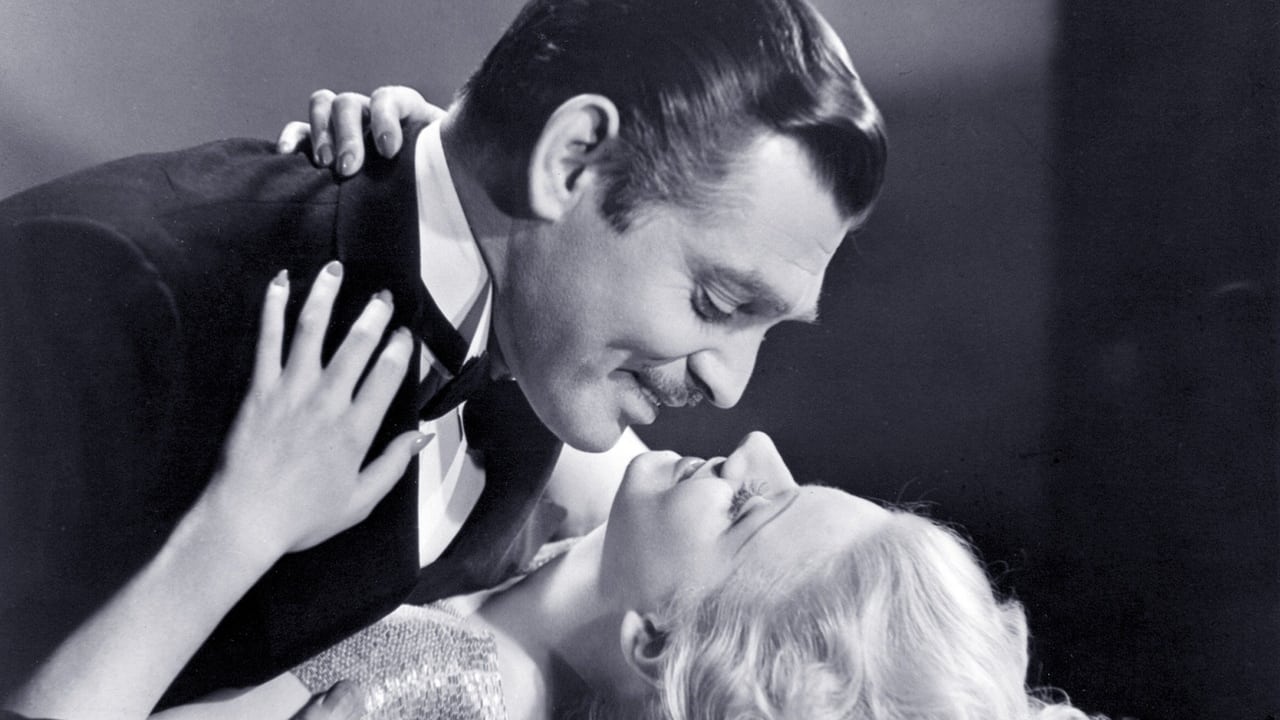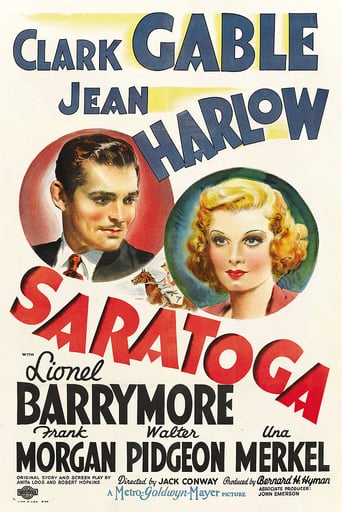

Wonderfully offbeat film!
... View MoreAdmirable film.
... View MoreA terrific literary drama and character piece that shows how the process of creating art can be seen differently by those doing it and those looking at it from the outside.
... View MoreThrough painfully honest and emotional moments, the movie becomes irresistibly relatable
... View More***SPOILERS*** More of a curiosity piece then anything else "Saratoga" turned out to be Jean Harlow's last movie dying on June 7, 1937 of kidney failure a the young age of 26 some six weeks before the film was released! With the movie 90% finished and the MGM studios was forced to use a stand in for Miss Harlow to finally finish the movie! That instead of re-shooting the entire film with another actress replacing her. As things turned out "Saratoga" turned out to be the biggest grossing MGM film of 1937. There was also in the film Lionel Barrymore as Grandpa Clayton who soon ended up in a wheelchair because of his severe arthritic condition.The film involves a round robin romance between socialite Carol Clayton, Jean Harlow, bookie Duke Bradley, Clark Gable, and Carol's fiancée Wall Sreet bigwig Hartley Madison, Walter Pidgeon. It's Duke who at first has all the cards by having the deed to Carol's father's Frank Clayton, Jonathan Hale, horse breeding farm. It was Frank who owed Duke $60,000.00 in bets that he lost to him who signed the farm over to Duke as collateral until he could come up with the 60 G's. As it turned out Frank died of a heart attack at the Saratoga Racetrack before he could pay Duke back and thus ended up losing the farm or racing stable,Brookvale Stables,to him for good.It's when Duke met Carol who was trying to buy her late father's stables back for him that he suddenly got the hots for her. It's was then that Duke, seeing a golden opportunity, tried to destroy Carol's relationship with Hartley by trying to bust him in a betting contest at not only at the Saratoga Race Track but a number of tracks, Belmont Pimlico Hialeah, up and down the East Coast. As we soon found out It was Hartley who in fact won some $60,000.00 off Duke betting with him over the years. And now Duke sees an opportunity to not only get his money back but end up stealing Hartley's girl Carol as well.As the movie builds up to the big race "The Hopeful Stakes" at Saratoga you soon completely forget about it in that by then Jean Harlow or Carol Clayton was history with only a stand in replacement filling in for her. As confusing as the film or horse opera was this made it even more confusing to follow. But it was the final racing sequences in it that kept you from falling asleep or just turning it off altogether.You can see right away the chemistry between Clark Gable and Jean Harlow which was so natural that it made you feel as if the two weren't acting at all. There was even a number of scenes in the film where Jean as Carol was suffering from a serious cold or flu that almost mimicked her real illness that in fact ended up taking her life.
... View MoreAlthough Saratoga is a lighthearted comedy about the horse racing game set in that former pleasure town of the rich and famous with the death of Jean Harlow while filming this movie it carries an aura of sadness that at least for me is impossible to overcome.It's an average film and not anything close to what I believe Harlow's best work on screen in such items as Libeled Lady, The Girl From Missouri, Dinner At Eight, and Red Dust. Still her final film was with her most frequent screen partner and one whom she had great chemistry with.Clark Gable plays a bookmaker who has some big IOUs from Jean's father Jonathan Hale who dies and passes those on to his daughter. Jean has an easy out if she marries wealthy Walter Pidgeon who's panting hot and heavy for her. But she eventually sees Gable is the one for her.What is also sad is that Harlow for whatever reason kept going when it is obviously apparent she's suffering from the undiagnosed uremic poisoning that eventually killed her. That's a separate issue from the legendary story that her mother's Christian Science beliefs prevented her from seeking the medical treatment that would have saved her life. Maybe she should have been replaced and the film re-shot, who can know about these things? Jean Harlow was the subject of a couple of lurid films based on Irving Schulman's book about her life that came out in the Sixties. By all accounts I've read about her from her contemporaries, Jean Harlow was a kind and gracious woman who was generous to a fault and always willing to help a newcomer. I would recommend reading Rosalind Russell's autobiography Life Is A Banquet where she talks about how Jean helped Russell the rookie on the set of China Seas.So this review is dedicated to Jean Harlow and for all the great performances she had in her that we were never destined to see.
... View MoreSARATOGA (Metro-Goldwyn-Mayer, 1937), directed by Jack Conway, is a lighthearted comedy with some sadness attached to it. Jean Harlow, it's leading lady, never reached the finish line for this one, having died before completion got underway. Cast for the sixth and final time opposite Clark Gable, this was easily their breeziest assignment together. Walter Pidgeon, making his MGM debut, rounds out the trio playing the other man competing for his girl's affections.With full indication of a horse racing story, the film's introduction starts off with the camera capturing the full view of racing hoofs as jockeys ride up the racetrack before the rising dust covers the screen as the credits roll to upbeat swing music of unseen vocalist belting out its title tune. Fade in begins at Saratoga's Brookvale Farm where Grandpa Clayton (Lionel Barrymore), a horse-breeder, is disappointed that his son, Fran (Jonathan Hale) has sold off his stallions to banker Ed Kenyon to cover up his financial losses. Because Clayton owes $60,000 back debt to best friend and bookmaker, Duke Bradley (Clark Gable), he offers him the mortgage deed to his property as security. Clayton's daughter, Carol (Jean Harlow), while in London, has become engaged to Hartley Madison (Walter Pidgeon), a wealthy New York stockbroker who had taken Duke for $50,000 at Belmont. While at the races, Clayton suffers a fatal heart attack shortly after Carol's return. As Carol calls for Duke to sell her back the farm, he refuses so not to foreclose on her grandfather. Intending on having Hartley give her the money to pay off Duke, Duke has other plans on getting back his losses. Regardless of trying to outbid the rich "sucker" at both auction and racetracks, Carol arranges in keeping Bradley one step ahead of Duke.Taken from an original screenplay by Anita Loos and Robert Hopkins, the plot revolving around a snobbish girl engaged to a millionaire and becoming attracted to a smooth talking bookie was typical movie-making in the 1930s. Considering the plot being ordinary, the winning combination of Gable and Harlow makes SARATOGA all its worth. With the finished product not going according to plan due to Harlow's untimely death, how the writers managed to work around her character is more interesting than the story itself. Aside from extended use of supporting players Una Merkel (Fritzi, Duke's old flame), and Frank Morgan (Jesse Kiffmeyer, Fritzi's jealous husband allergic to horses), there's also noticeable out-takes revolving around the real Harlow and those featuring her double with face covered by large hats and camera capturing her discreetly from the back. The frequent mention of Carol's illness was certainly an excuse by not keeping her in full view. One surviving scene where Harlow's Carol, examined by Doctor Hanerstein Beard (George Zucco), constantly telling him, "I'm perfectly well. There's nothing the matter with me," comes across as too close for comfort, considering the actual circumstances of her being gravly ill during filming. On the lighter side, Harlow demonstrates her flare for comedy in a memorable scene where she claims to have picked up cigar smoking to avoid any detection of Duke's presence in her room (who's hiding underneath her bed) from her fiancé' Bradley, after noticing the burning cigar resting on her ashtray. Gable comes across as very likable through his constant catch phrase to everyone, male or female, "I love you." When Carol uses it on Duke, he replies amusingly, "Hey, what are you trying to do, steal my gag line?" In between the battle of wits come song interludes by Walter Donaldson, Robert Wright and Chet Forrest: "Saratoga" (sung by Grace Saxon and the Four Esquires); "The Horse With the Dreamy Eyes" (sung by Cliff Edwards, Una Merkel, Clark Gable and Hattie McDaniel); "Saratoga" and reprise of "The Horse With the Dreamy Eyes." The Horse song, set on the "The Racing Special" train bound to and from Miami, is noteworthy as one of the rare cases where Gable participates in a song, and quite good at that.Rounding out the cast of co-stars include Hattie McDaniel as Rosetta Washington, Harlow's maid; Cliff Edwards as "Tip" O'Brien; Frankie Darro the jockey, Dixie Gordon; and Margaret Hamilton appearing as the homely woman on the train seated next to Jesse (Morgan), founder of Harriet Hale Beauty Cream. Lionel Barrymore, a reliable actor, is nearly unrecognizable with his Claude Gillingwater Sr.-type performance playing the aging grandpa sporting silver hair and droopy mustache.Regardless of title, not every scene takes place in Saratoga, but at Tropical Park in Miami, Florida, and at Churchill Downs in Louisville, Kentucky. Highlighting with a horse race sequence between Moonray and Dubonnet leading to a photo finish, SARATOGA concludes with its own photo finish with that of Jean Harlow (1911-1937) in a fond farewell to her work. To echo those words of Gable's Duke Bradley, fans would gladly say, "Jean, we love you." Formerly available on video cassette in the 1990s, SARATOGA is certainly a sure bet whenever presented on Turner Classic Movies. (*** markers)
... View MoreIt's hard to work up any enthusiasm for this sort of comedy from MGM. With stars of the caliber of Gable and Harlow, one expects much more than a routine story of the jet set circa 1930s amid a horsey racetrack background.Furthermore, watching it with an awareness that Harlow was gravely ill during filming makes the comedy even less enjoyable than it's supposed to be. Her illness shows in more than the make-up needed to hide the shadows around her eyes. She seems to be forcing herself to go through with any sense of comic timing for the sake of getting through the filming of a very tedious comedy. A certain listlessness can be detected in many of her scenes. The use of a double is painfully obvious toward the last third of the film.Seldom is there any inkling of the comic skill Gable showed in films like IT HAPPENED ONE NIGHT--and never is Jean Harlow anything less than remote and listless even in some of her best moments. The cigar smoking scene is the only highlight in this otherwise feeble comedy.Only bits of trivia awareness can heighten any interest in this one. Margaret Hamilton and Frank Morgan have a train scene that reminds us they were soon to be prominently featured in THE WIZARD OF OZ. Lionel Barrymore actually walks around without even a cane--and Walter Pigeon makes his MGM debut, giving perhaps the only reasonably faultless performance in a weak film.Summing up: Insignificant both as a comedy and as Jean Harlow's last film. Unfortunately, her bloated appearance and obvious signs of illness hang like a pall over most of the film.
... View More